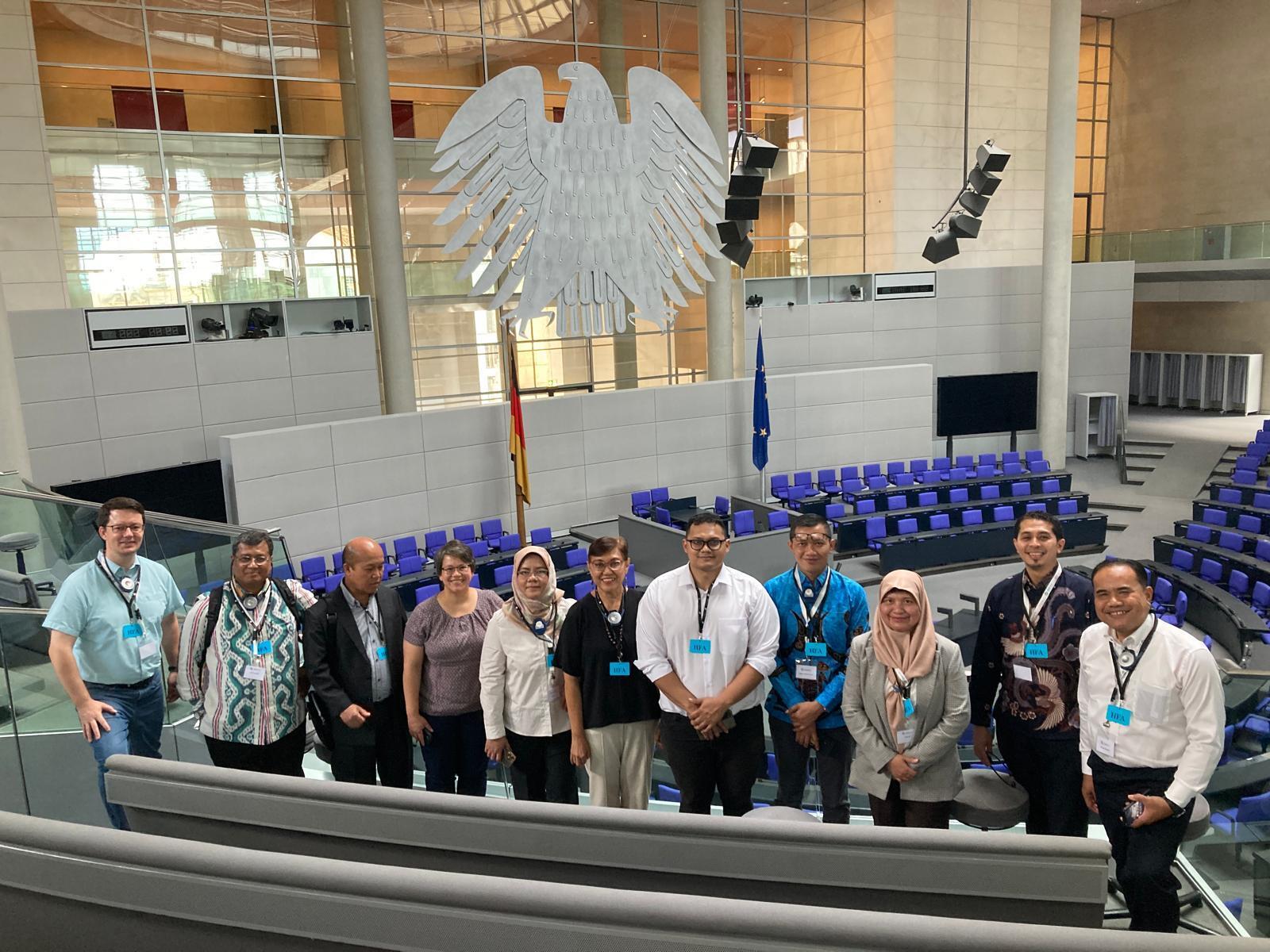Business and Human Rights
Strengthening Business and Human Rights Together

Vertreter des indonesischen Ministeriums für Recht und Menschenrechte (Kemenkumham) erkundigen sich in Berlin nach den deutschen Erfahrungen zum Lieferkettengesetz.
© FNF IndonesiaIndonesia is one of the pioneers in Southeast Asia
In a globalised economy based on the division of labour, it is not easy to guarantee the protection of human rights along global supply chains, but it is necessary. Following controversial debates, Germany and Europe have recently introduced new laws to ensure better protection. The normative framework for national legislation is provided by the UN Guiding Principles on Business and Human Rights adopted by the UN Human Rights Council in 2011, whose principles are summarised in the three-pillar model of ‘protection, respect and remedy’. Few people realise that Indonesia, as one of the pioneers in Southeast Asia, is also taking concrete steps towards implementing these guiding principles. During a week-long visit to Berlin in August 2024, a delegation from the Indonesian Ministry of Law and Human Rights found out about the current status of the new supply chain law in Germany. The insights gained will be incorporated into the political process in Indonesia.
It is remarkable that Indonesia - a heavyweight in Southeast Asia with a population of almost 280 million - is committed to addressing the issue of business and human rights at the highest level. On 26 September 2023, President Joko Widodo issued a presidential decree making the implementation of a National Strategy for Business and Human Rights mandatory. These are positive developments for Germany and Europe in the long term. After all, it is obvious that human rights can be best protected along global supply chains when as many players as possible are actively involved. The Indonesian efforts have the potential to simplify inspection processes in the future. For example, it is a challenge for a medium-sized company in Germany to precisely trace ramified supply chains all the way to rural Indonesia. As effective human rights protection must be as unbureaucratic and easy to implement as possible, it is therefore helpful if governments establish comparable standards worldwide.
Opportunities for greater economic exchange
Indonesia is becoming an increasingly important global economic player as a sales market and due to the global demand for its sought-after raw materials and goods, as well as its geopolitical situation. However, trade relations between Europe and Indonesia have been less than harmonious in recent years. Against this background, good news is welcome. For Germany and Europe, there is the prospect of boosting trade and strengthening economic ties on the basis of comparable standards of human rights protection. The latter is in line with Germany's strategic goal of diversifying economic cooperation in Asia.
But first, the Indonesian Ministry of Law and Human Rights (Kemenkumham) faces a Herculean task: in the period from 2023-2025, it must bring the National Strategy for Business and Human Rights to life and monitor its implementation. This requires close cooperation with other Indonesian ministries, civil society institutions and regional governments. Comprehensive processes must be devised, consensus established and responsibilities clarified at ministry and local government level. And finally, all this has to be realised in a country where the uniform enforcement of state standards is sometimes a challenge and which extends over a vast archipelago with around 7000 inhabited islands. The exchange with dialogue partners in Germany comes at the right time for this pioneering work.
Cooperation with the Ministry's Human Rights Department
The Friedrich Naumann Foundation for Freedom (FNF) in Indonesia sees the protection of human rights as an important prerequisite for free trade and more exchange between Europe and Indonesia. At the same time, it is important that Indonesian institutions formulate and take responsibility for the establishment of human rights standards. Standards imposed from outside, which may even be articulated in a patronising manner, are counterproductive. FNF has been supporting this process of independent Indonesian definition and implementation of rules at the interface of business and human rights since 2021. The process is naturally lengthy; however, the ministry has been able to achieve concrete progress in recent months. The establishment of national and regional task forces and the increasing expansion of the circle of decision-makers involved in the implementation of the National Strategy is cause for optimism.
The eight-member Indonesian delegation that visited Berlin as part of the IAF visit programme took the opportunity to learn from the experiences before and after the introduction of the German Supply Chain Act. They also learnt that not all those affected in Germany are happy with the new regulations: Although all stakeholders are united in their desire to protect human rights, the new obligations are not causing much enthusiasm among some companies, which are already groaning under the burden of a multitude of other legal and bureaucratic regulations. What's more, they will have to familiarise themselves with a new set of rules in the near future - because at European level, the even stricter Corporate Sustainability Due Diligence Directive (CSDDD) has already been adopted. In this respect, the talks in Berlin provided the Indonesian delegation with illustrative material on how some processes could possibly be organised in a simpler and less bureaucratic manner - and thus be successful in the long term.
The spirit of pragmatism prevailed during the week-long visit, which included meetings at the Federal Ministry of Justice, the German Bundestag and with human rights non-governmental organisations as well as talks with experts from supervisory authorities, representatives of business associations and diplomats. Delegation leader Harniati, Director of Human Rights Cooperation at the Indonesian Ministry, summarised: ‘For us, this week offered a unique opportunity to draw conclusions from German experience and to recognise new connections. This will help us to implement the National Strategy for Business and Human Rights at home in Indonesia’. FNF in Indonesia will support them in this endeavour.
